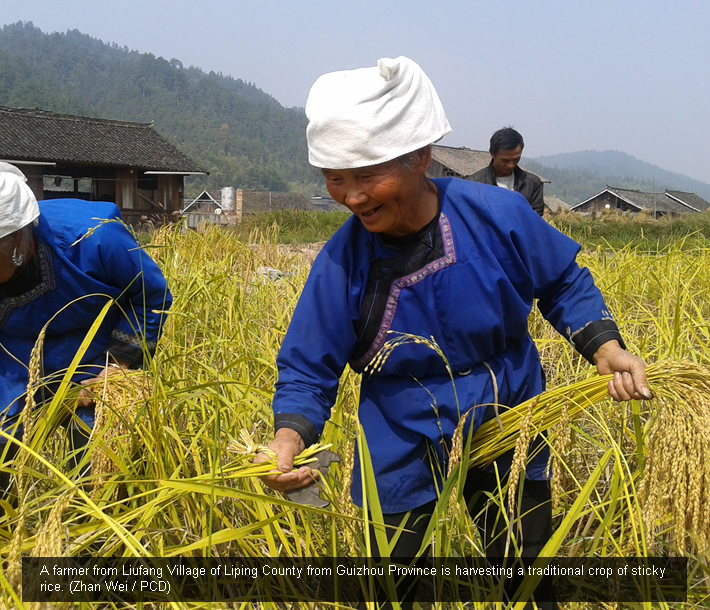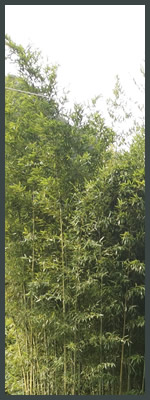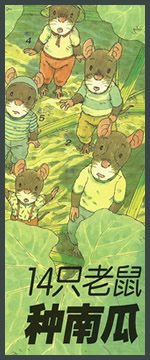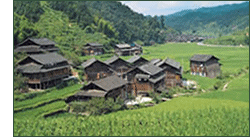Partnerships for Community Development
|
Hello! Henry
Please put our email address enews@pcd.org.hk to your email address book so as to prevent the e-Newsletter from dropping to the "Spam Box" and ensure your access to it.
|
 |

Conserving Traditional Crop Varieties As a Sustainable Approach to Agriculture
Modern agriculture, which seeks high output as its sole purpose, depends on new crop varieties developed by modern technology. This has led to all sorts of problems because every new variety is introduced with a set of standardised or normalised cultivation technologies in which chemical fertilisers and pesticides are indispensable. Not only has modern agriculture brought problems of food safety and environmental pollution, it has also resulted in problems such as pests and diseases because new varieties are often unsuited to local climate and environment. In contrast, there are many advantages in the conservation of traditional crop varieties which can enhance the biodiversity of the farmland, increase output and guarantee food security. It is also an important factor in the development of ecological agriculture.
This issue of the E-newsletter explores the importance and advantages of conserving traditional crop varieties and the problems brought by new varieties developed by modern agriculture. Governments around the world have been promoting cultivation of foreign crop varieties. However, in places such as Mainland China, Vietnam and Mexico, there are cases of farmers who have chosen to continue with or return to the cultivation of traditional crop varieties. In Liufang Village of Liping County, Guizhou, villagers have returned to cultivating traditional varieties of rice after cultivating hybrid rice for a number of years. In Wayao Village of the suburban district of Guiyang, Guizhou, a villager narrates the story of an ancestor who got hold of a variety of bean after much hardship. This traditional variety of bean has been passed on for generations. Her views and reservations about the cultivation of foreign crop varieties allow us a glimpse of the importance of traditional crop varieties to farmers' livelihoods.
|

 |

Bamboo— Guardian of Ecology, Partner in Production, and Companion in Daily Life of the Miao People of Mashan
Mashan, a prefecture in Guizhou Province inhabited by the Miao people, is a typical karst peak cluster-depression area suffering from severe soil denudation, and there is a pressing need to restore its ecology. Over the last two centuries, the governments of the various Chinese dynasties had, for convenience of governance, introduced a number of outside crops. These crops were not suitable for Mashan’s ecological environment and led to soil denudation. The key to restoring the original environment, therefore, is to grow plants that fit the local natural ecology. Bamboo is one of the most suitable choices. PCD has been supporting work on ecological restoration in Mashan and trying to help villagers learn of the importance of bamboo cultivation for ecological restoration…… [More]
|
 |
|
 |

The Stories of the Pumpkin, the Little Salamander and the Soup of Stones—Creative Ideas for Parenting Education on Sustainable Living
It is hard for children to understand sustainable living or the importance of a harmonious coexistence of human beings and nature, among human beings and between individuals and the community. However, Sanlidou Parenting Workshop, a partner of PCD in Guangzhou that works on parenting education, has been able to plant ideas of sustainable living in the minds of children through creative forms of storytelling. While drawing on popular picture storybooks, Sanlidou also adopts diverse approaches to storytelling, such as playing games, collective drawing, dramas, music, etc. Let’s see how the minds of children are opened by the stories of the pumpkin, the small salamander and the soup of stones…… [More]
|
 |
|
|
| |
You may be interested in the following information:
Our Vision and Mission /
History of PCD /
Our Publications /
Primary Approaches – Training of Facilitators /
Where We Work
|
|
|
|

| Though we are based in different regions and have different work approaches, we are all striving to practise sustainable living, and the ripples we create will definitely benefit other partners. Please share your experience and reflections with us and send your stories to enews@pcd.org.hk. The subject of your stories should be related to your programmes. Please provide your name, project background and photographs. Please do not exceed 2,000 words. |

|
|

 Established in Hong Kong in May 2001, Partnerships for Community Development (PCD) is a community development NGO set up and funded by the Kadoorie Foundation (via a stream of funds allocated by the Hon. Mrs McAulay). The Foundation is a Hong Kong-based trust founded in 1970 by the late Sir Horace Kadoorie, who believed in the principle,"Help people to help themselves".
Established in Hong Kong in May 2001, Partnerships for Community Development (PCD) is a community development NGO set up and funded by the Kadoorie Foundation (via a stream of funds allocated by the Hon. Mrs McAulay). The Foundation is a Hong Kong-based trust founded in 1970 by the late Sir Horace Kadoorie, who believed in the principle,"Help people to help themselves".
PCD believes that everyone, however deprived in material terms, has the right and the ability to lead a dignified and sustainable life in harmony with others, with nature, and with the world at large. Individual well-being is crucial in maintaining a harmonious and sustainable community. PCD believes that the community has to work together to reflect on its relationship with nature and on its cultural traditions.
|

Hong Kong Head Office:
13/F Chi Wo Commercial Building,
20 Saigon Street, Jordan,
Kowloon, Hong Kong
Tel: (852) 2458-0011
Fax: (852) 2430-7099
Email: info@pcd.org.hk
Webpage: www.pcd.org.hk
Programme Offices:
Yunnan Office
Sichuan Programme Office
Guizhou Programme Office
Guangxi Programme Office
Guangdong Programme Office
|
|
 Subscribe our E-newsletter Subscribe our E-newsletter
|
Unsubscribe
Tip - If you add enews@pcd.org.hk to your email address book, your email system will always recognize our message, ensuring our newsletter won't be classed as spam and you won't miss out. |
|